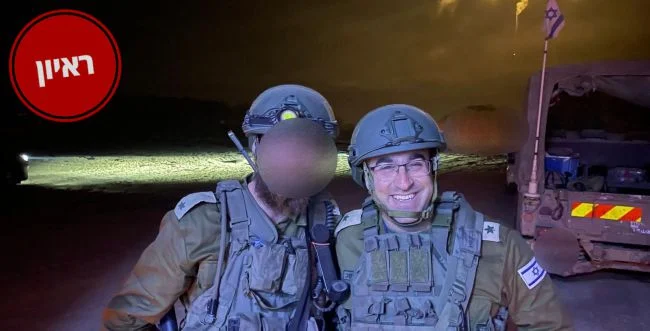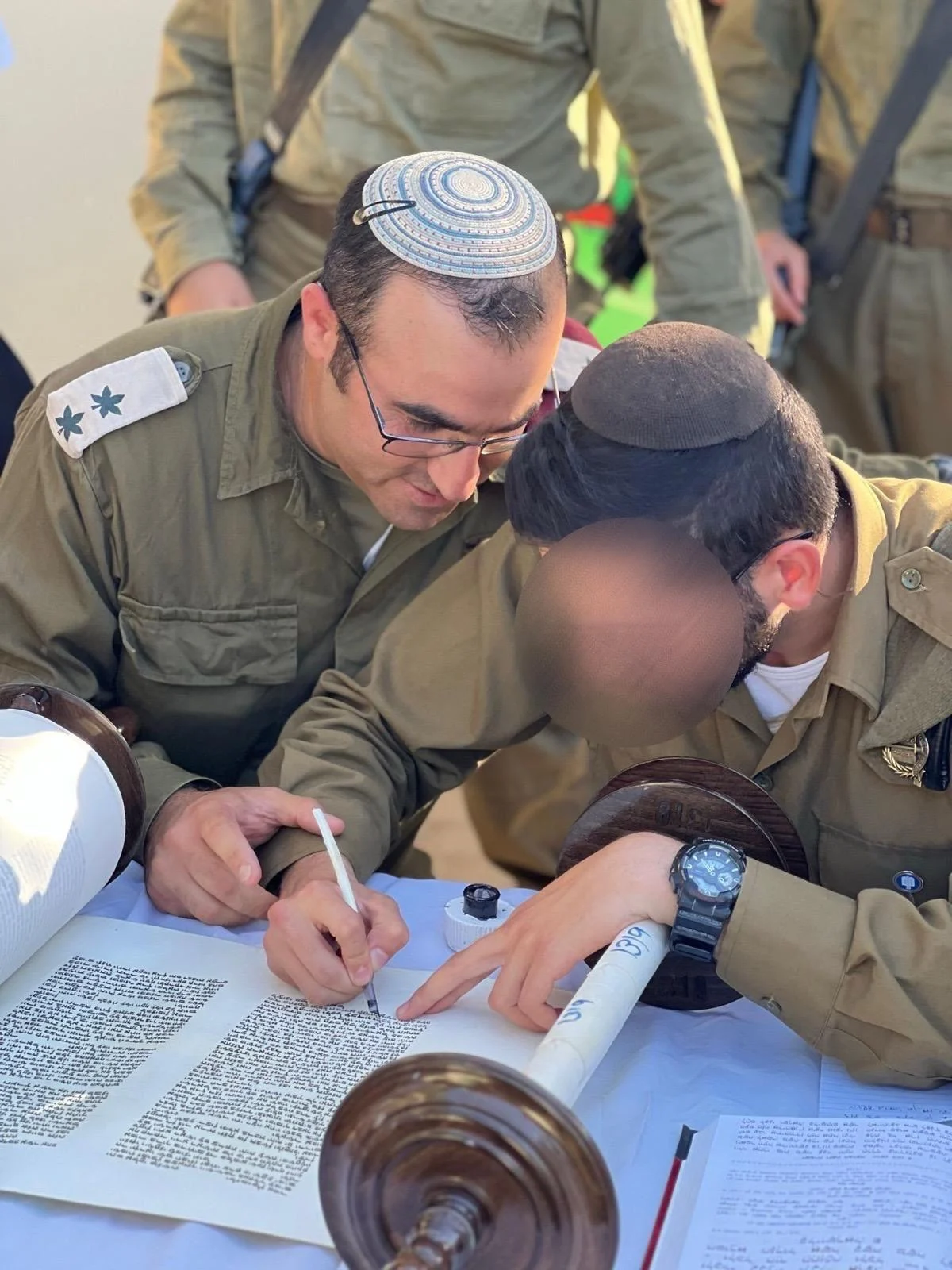With a Shofar and Tefilos: Meet The Southern Command Rabbi In The Trenches
For over 600 days, the Southern Command Rabbi, Lt. Col. Rabbi David Chaimov, has been working around the clock. Between battle zones and kitchens, Torah lessons and identifying fallen soldiers, the military rabbi holds together all worlds: the soldiers, their spirit, his home in Mitzpe Ramon, and the vibrant spirit of victory.

The Iron Swords War has lasted over 600 days, and one of the permanent staff in the Southern Command who hasn’t rested since the Simchat Torah attack is Lt. Col. Rabbi David Chaimov, caught off guard by the war like the rest of us.
Rabbi Chaimov (42) lives with his wife Shirley and their six children in Mitzpe Ramon. He calls Shirley, an educator in the community, a “lioness who has survived a year and a half of this war.”
Rabbi Chaimov began his military career in the 890th Paratroopers Battalion, later taking command roles in various units before transitioning to the military rabbinate, where he has held significant positions for the past five years. In the last two years, he has spent most of his time between rabbinical facilities and maneuvering units in Gaza and assembly areas.
Rabbi Chaimov says, “I started my military career as a fighter, and it was precisely my combat experience in the 890th Battalion and field command that made me realize how much soldiers need someone who understands their emotional and spiritual sides.”
He highlights the Southern Command Rabbinate’s wartime activities, including the burial unit (YKP), which handles fallen IDF soldiers, and the YSR unit, a combat team that enters battle zones during disasters to extract and care for bodies until they reach Israeli territory. Under his command are also division, brigade, and battalion rabbis, as well as rabbinical staff at various bases.
Soldiers and Officers Worked in Harsh Conditions, Witnessing Horrific Sights
Recalling Simchat Torah and the shock of Hamas’s attack, Rabbi Chaimov describes how, within hours, unit teams began clearing settlements and roads of scattered bodies. Soldiers and officers worked in grueling conditions, facing horrific scenes.
What emotional support is provided to rabbinate personnel?
“Each battalion has a dedicated mental health officer in personal contact with every fighter. This is a lesson from the IDF’s mental health reform, which has seen significant changes in recent years.”
Special operations conducted by the rabbinate in the past year and a half include pre-holiday events: distributing shofars for Rosh Hashanah, arba minim for Sukkot, ornate menorahs for Hanukkah, and the complex logistical operation for Passover, koshering all IDF kitchens after extensive preparations with logistical and kitchen teams.
“Imagine kitchens in intelligence bases or classified areas where only a small team is authorized to enter. That’s not even mentioning kitchens in complex combat zones,” he says.
When asked about positive moments in the past year and a half, he mentions weddings held at military bases and a bar mitzvah for a reservist in his late 40s, complete with ornate tefillin and a fully catered event. “It was moving,” he notes.
Behind Every “Cleared for Publication” Is Immense Work and Pain
Rabbinate personnel face the war’s toughest moments. “Think about it,” Rabbi Chaimov says, lowering his voice. “When a civilian reads a ‘cleared for publication’ notification, behind those words is unimaginable pain and work by teams performing sacred tasks.”
Purification and Burial Preparation: The Essence of Rabbinate Dedication
“The reservists perform their work quietly, professionally. You barely hear a word in the compound, just a few critical instructions. These rabbinate teams, with huge hearts and noble souls, work with professionalism in chilling silence. Their eyes say it all, quiet, precise movements, and a gaze that absorbs pain without drowning in it. They don’t ask questions, only give the final honor to the maximum extent possible.”

Rabbis Send Fighters into Battle
In this war, military rabbis are increasingly visible in preparing fighters for battle. “Battalion rabbis recite the prayer before combat and blow the shofar. It’s a strengthening, moving event etched deeply in the fighters, a beautiful custom that enhances the spirit of victory,” Rabbi Chaimov says.
Beyond battles and routine command work, Rabbi Chaimov visits the homes of permanent or reserve soldiers to foster “peace at home” and strengthen marriages strained by long absences. Back at the base, soldiers discuss conversion processes they’ve recently begun.
In photos from Southern Command Rabbinate activities in Gaza, one image stands out: Rabbi Chaimov, fully equipped with a helmet, vest, and weapon, giving a Torah lesson inside an armored vehicle. He explains, “Rabbinate teams are an integral part of the fighting, strengthening morale. The main challenge is being present wherever soldiers need us, providing quick, professional, and spiritual responses to every need.”
A military cot in his office, where he sleeps most nights, hints at his rare visits home. He reminds me of his nickname for his wife, the “lioness.”
“As rabbis, we often encounter halachic issues and questions. The command rabbinate provides 24/7 halachic guidance, finding solutions with great resourcefulness. Through the same communication channels, we supply all religious needs to every soldier and fighter, from tzitzit or a siddur matching their father’s tradition to establishing synagogues wherever needed.”
At the interview’s end, Rabbi Chaimov praises the reservists supporting the rabbinate, without whom the system wouldn’t hold. “These are people with careers and businesses who left everything for hundreds of reserve days. The people of Israel owe them immensely.”
Amid the war, between battle zones and kitchens, Torah lessons and identifying fallen soldiers, the military rabbi holds all worlds together: the soldiers, the spirit, his home in Mitzpe Ramon, and the vibrant spirit of victory. Sometimes, sacred work isn’t just in what’s done but in how it’s approached and sustained over time.